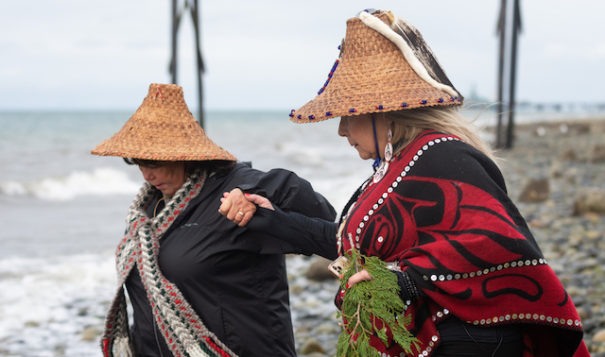News Based on facts, either observed and verified directly by the reporter, or reported and verified from knowledgeable sources.
Tribal members, community offer prayer and cedar for the return of orca
 Lummi Tribal members Ellie Kinley, left, and Raynell Morris, president and vice president of the non-profit Sacred Lands Conservancy known as Sacred Sea, lead a prayer for the repatriation of southern resident orca Sk’aliCh’elh-tenaut — who has lived and performed at the Miami Seaquarium for over 50 years — to her home waters of the Salish Sea at a gathering Sunday, March 20, 2022, at the sacred site of Cherry Point in Whatcom County, Wash.
The Bellingham Herald
Lummi Tribal members Ellie Kinley, left, and Raynell Morris, president and vice president of the non-profit Sacred Lands Conservancy known as Sacred Sea, lead a prayer for the repatriation of southern resident orca Sk’aliCh’elh-tenaut — who has lived and performed at the Miami Seaquarium for over 50 years — to her home waters of the Salish Sea at a gathering Sunday, March 20, 2022, at the sacred site of Cherry Point in Whatcom County, Wash.
The Bellingham Herald
In continuing to offer prayer for the repatriation of southern resident orca Sk’aliCh’elh-tenaut from the Miami Seaquarium to her home waters of the Salish Sea, Lummi Tribal members and the Bellingham community gathered Sunday, March 20, at the sacred site of Cherry Point — named Xwe’chi’eXen in the Lummi language.
Led by enrolled Lummi Tribal members Ellie Kinley and Raynell Morris, president and vice president of the non-profit Sacred Lands Conservancy known as Sacred Sea, the group prayed with songs from the Bob Family singers.
Morris explained how in Xwlemi Chosen, the language of the Lummi people, orca are called “qw’e lh’ol’ me chen,” meaning “our relations who live under the water.”
Sacred Sea passed out cedar to be placed in the water as Lummi tradition says salmon, and therefore orca, come home by the smell of cedar. Others brought flowers to be placed in the waters for her.
“Tah-Mahs (Kinley), my Tribal sister, and I went and did a water ceremony outside of her tank on her 50th year anniversary in Miami. We brought our cedar and put it in the water for her and told her, ‘When you smell this, you’re home’.” said Morris.
Reverends Rose Edington and Mel Hoover of the Bellingham Unitarian Fellowship also offered prayer for Sk’aliCh’elh-tenaut’s return home.
“Often we as ministers are called upon to pray for the health of those in need of healing. We believe that healing prayers can help sustain us and those for and with whom we pray, but the words themselves are not enough. Our prayer must also be our actions. Let us be grateful that we have voices to raise. May the voices of our spoken and written word and songs reach the conscience of those responsible for the care and well-being of Sk’aliCh’elh-tenaut. That they will work with the humans of the Salish Sea to set her free and to return her safely home to her family,” Edington said.
More than 50 years ago, Sk’aliCh’elh-tenaut (pronounced SKAH-lee-CHUKH-tah-NOT) — known by her stage name of Lolita and as Tokitae by others — was captured at Whidbey Island’s Penn Cove. Following a USDA investigation and as-per a new licensing agreement, it was announced she has been retired from performances at Miami Seaquarium earlier this month.
Natasha Brennan covers Indigenous Affairs for Northwest McClatchy Newspapers. She’s a member of the Report for America corps.
